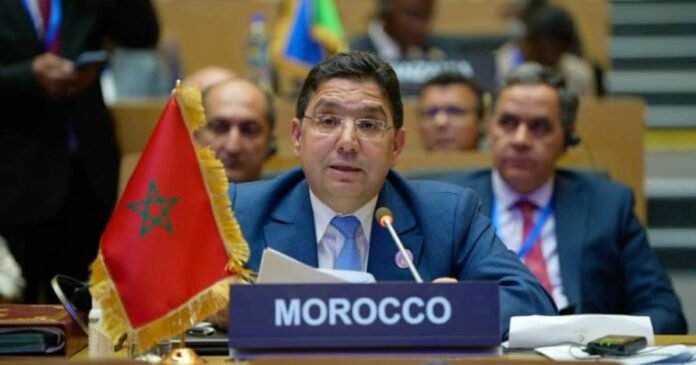Morocco enters Addis Ababa armed with Resolution 2797:
A decisive continental battle looms as royal diplomacy reshapes Africa’s strategic future
In three months, Addis Ababa will host the 38th African Union Summit—an event that could redefine Africa’s political balance. This time, Morocco will not just attend as a “returning member,” but as a confident diplomatic power, strengthened by a major institutional victory: UN Security Council Resolution 2797, adopted on October 31, 2025, which recognizes Morocco’s Autonomy Plan under its sovereignty as the only realistic basis for resolving the Sahara dispute.
A Moroccan victory that reshuffles Africa’s diplomatic landscape
Resolution 2797 is more than a reaffirmation of Morocco’s legitimacy—it signals the end of the ambiguity that once allowed the so-called “SADR” to survive within the African institutional framework.
By establishing that the solution lies within Morocco’s sovereignty, the UN has effectively laid the groundwork for revoking the separatist entity’s membership in the African Union.
This marks a strategic evolution in Morocco’s African policy—from defense to initiative, from reaction to projection—in line with King Mohammed VI’s long-term royal vision. Since rejoining the AU in 2017, Morocco has pursued a patient, intelligent diplomacy focused on rebuilding alliances from within and promoting unity over division.
South Africa and Algeria: the last line of resistance
As the decisive Addis Ababa summit nears, anxiety grows in the opposing camp. Reports, including one from Deutsche Welle, indicate that South Africa is leading efforts to block Morocco’s push, invoking procedural hurdles requiring a two-thirds majority for expulsion.
Yet the balance of power is shifting: Morocco has achieved significant breakthroughs in English-speaking Africa, securing support from Kenya and Ghana, and pragmatic neutrality from Nigeria and Ethiopia.
In a remarkable twist, Morocco has begun making inroads inside South Africa itself. In July 2025, the opposition party Spear of the Nation, led by former President Jacob Zuma, declared its support for Morocco’s sovereignty over the Sahara. Shortly after, members of the ruling African National Congress submitted a motion urging a review of Pretoria’s pro-Polisario stance.
Is this the first crack in the ideological wall that has long defined the Southern Bloc?
A decade of strategic diplomacy
By 2026, Morocco will mark ten years since its historic return to the AU—ten years that have transformed its continental influence. Today, only 13 of 54 African states still recognize the “SADR”, while Morocco’s investments and partnerships stretch from West to East Africa, cementing its image as a credible partner for development, security, and integration.
Addis Ababa 2026: Africa’s moment of truth
The upcoming AU Summit will not be a routine meeting—it will be a moment of continental reckoning.
Will Africa continue to shelter a phantom entity unrecognized by the UN, or will it align itself with international legality and political coherence?
Armed with Resolution 2797, robust alliances, and a royal vision centered on unity and development, Morocco approaches Addis Ababa with confidence and foresight.
This is not merely a diplomatic confrontation—it is a clash between illusion and realism, between stagnation and progress.
Key questions:
-
Will Resolution 2797 mark a turning point in Africa’s geopolitical consciousness?
-
Can South Africa and Algeria maintain their influence amid shifting continental dynamics?
-
Could the 2026 Addis Ababa Summit unofficially mark the end of the Polisario within the AU?
-
How far can Morocco’s “soft power” diplomacy reshape the very architecture of African governance?
Conclusion:
Morocco’s current diplomatic momentum is not accidental—it is the fruit of a visionary royal strategy, grounded in foresight, legitimacy, and the belief that Africa’s future belongs to cooperation, not fragmentation.
If Addis Ababa becomes the stage of a decisive moment, it will be remembered as the beginning of Africa’s political renewal—under Morocco’s guiding realism.


